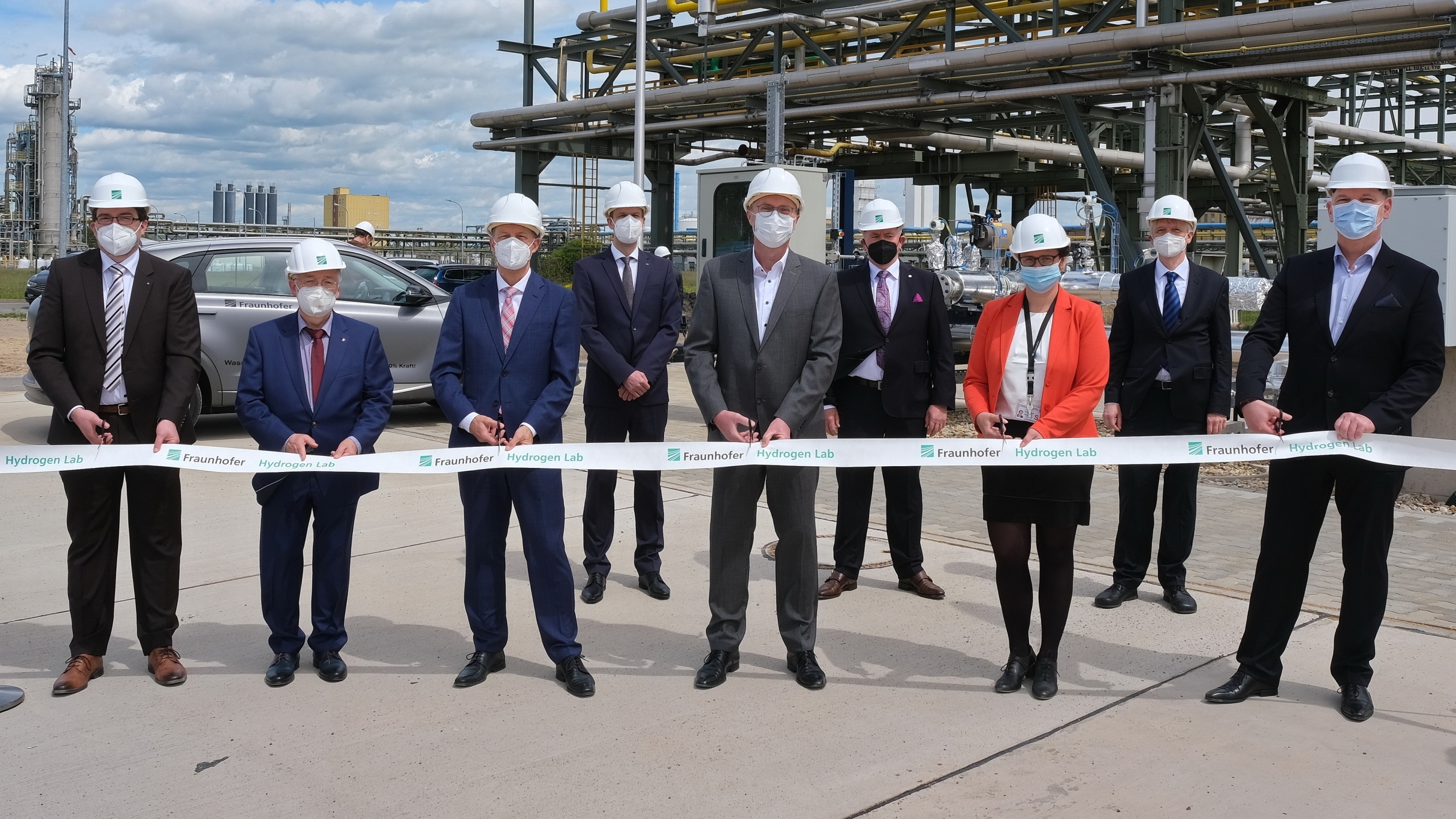Hydrogen Lab Leuna starts operation
Green hydrogen is a key element for a sustainable supply of raw materials to industry and the achievement of climate targets. With the Hydrogen Lab Leuna, the first pilot plant for testing and scaling the necessary electrolysis systems, which is fully integrated into a chemical park, started operation today. This supports the required market ramp-up of H2 technologies, which the Fraunhofer-Gesellschaft intends to further accelerate by bundling its hydrogen activities in northern and eastern Germany: the Hydrogen Labs in Leuna, Görlitz and Bremerhaven as well as an application center in Hamburg will be linked. This will create a globally unique range of pilot plants along the entire value chain of the hydrogen economy.


If hydrogen is produced by means of electrolysis using electricity from renewable energies, a climate-neutral raw material is created that is available as an energy carrier and storage medium as well as for material use as an alternative to fossil raw materials. This offers considerable potential for industrial processes and mobility with largely no need for fossil raw materials, as well as for the implementation of the energy transition.
The Fraunhofer Institute for Microstructure of Materials and Systems IMWS, the Fraunhofer Institute for Wind Energy Systems IWES and the Fraunhofer Institute for Machine Tools and Forming Technology IWU are now pooling their expertise to transfer this approach more quickly into application. With the Hydrogen Lab Leuna now open and the pilot plants currently being built in Görlitz, Bremerhaven and Hamburg, they cover the entire process from CO2-neutral power generation through offshore and onshore energy production, through testing and optimization of electrolysis and production of the equipment used in the process, to storage, transport and use of green hydrogen.
Support for market ramp-up
"The potential and uses of green hydrogen are extremely promising. Particularly in industry, the conversion of established production processes to hydrogen can make a decisive contribution to defossilization and to achieving the climate targets that have been set. The focus here must be on making the conversion economical and sustainable," says Prof. Reimund Neugebauer, President of the Fraunhofer-Gesellschaft. "The goal of the first Fraunhofer Hydrogen Lab in Leuna is to transfer hydrogen technologies from the laboratory to industrial scale. In the midst of the Central German chemical triangle, the location with its proximity to industry will quickly bring safe and effective solutions to application. Furthermore, the linkage with other emerging pilot plants along the entire value chain will additionally accelerate the market ramp-up and thus further strengthen and expand Germany's position in this strategically central field of technology."
The Hydrogen Lab Leuna offers modularly usable test areas for electrolysis systems, power-to-X and power-to-liquid projects up to 5 MW connected load. "The direct integration into the infrastructure of a chemical park offers us not only a connection to the H2 pipeline network of Central Germany, but also access to the local chemical industry, which needs a lot of hydrogen and has a great interest in using sustainable technologies and processes for this purpose. We will thus not only test and further develop electrolysers in Leuna, but also devote ourselves to the issues of power-to-X technologies. The first project with a high-temperature electrolyzer of the 1 MW class in combination with the production of green methanol has just started," says Dr.-Ing. Sylvia Schattauer, deputy director of the Fraunhofer IMWS and coordinator of the activities in Leuna.
Three megawatt-class Hydrogen Labs by the end of 2022
The three megawatt-class Hydrogen Labs have clear unique selling points: In Leuna, the pilot plant is directly connected to the pipeline of the regional chemical industry.
In Görlitz (12.3 MW connected load; planned commissioning: end of 2022), the focus is on the generation, storage as well as use of hydrogen for mobile as well as stationary fuel cells, especially for mobility and for supplying neighborhoods and industrial sites. This primarily includes the evaluation of stacks and systems, microstructure analytics and diagnostics, digitalization, power electronics, and certification.
In Bremerhaven (initially 2 MW connected load, expandable to 10 MW; commissioning: mid-2022), the special feature is the connection to a MW wind turbine and to the virtual replica of a power grid to investigate electrical properties of electrolysers. The laboratories will be complemented by an application center in Hamburg, where research will be conducted on the modeling and control of decentralized, local energy systems. At each of the four locations, the special features of regional industry are also taken into account, for example in offering specific test procedures for newly developed technologies. In Leuna, for example, processes are being scaled up in collaboration with the Fraunhofer Center for Chemical-Biotechnological Processes CBP in order to use green hydrogen in a value-adding way for the low-emission production of basic chemicals and synthetic fuels. For example, in the aforementioned start-up project, green methanol is being produced for the first time on an industrial scale.
The joint orchestration of activities by the three institutes enables, for the first time, a cross-sector demonstration of renewable energy generation towards the impact and modeling of the interaction of large regional energy generation, storage and consumer units. Plant engineers and component manufacturers are given the opportunity to test new developments in equipment on an industrial scale. The close cooperation of the participating scientists ensures an intensive exchange of experience, complementary development and facilitated access for industry.